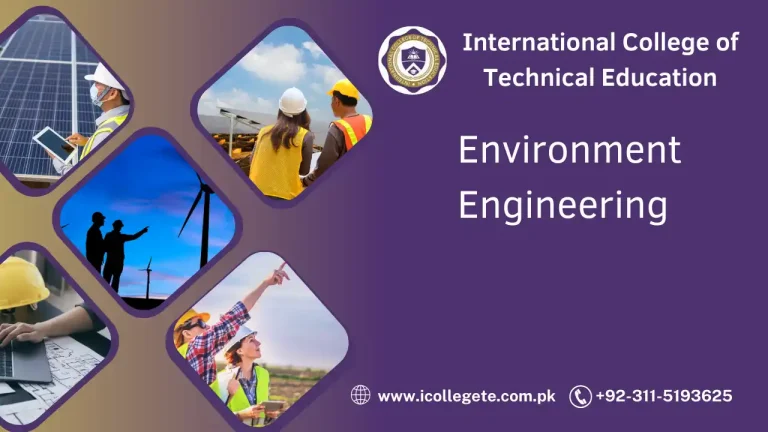Environmental engineering plays a critical role in protecting the environment and promoting sustainability. With growing concerns over environmental degradation, pollution, and climate change, the demand for skilled professionals in this field has never been higher. The Environmental Engineering course in Sargodha offers individuals the knowledge and skills necessary to address environmental issues, ensuring cleaner, healthier, and more sustainable environments for current and future generations.
The Environmental Engineering course is designed to provide students with a comprehensive understanding of the scientific, technical, and regulatory aspects of environmental management.
This course is perfect for those passionate about sustainability, eager to develop solutions for environmental challenges, and aiming to pursue a career in environmental management or engineering.
Course Overview
The Environmental Engineering course in Sargodha provides an in-depth exploration of key environmental issues, engineering practices, and regulatory frameworks. Through this program, students learn about pollution control technologies, waste management systems, environmental law, and the tools needed to assess environmental impacts. They will also study the principles of sustainable development and how to design solutions that balance environmental, social, and economic needs.
The course combines theoretical lectures with hands-on practical experience, allowing students to engage in real-world case studies and projects. The course duration typically ranges from several months to a year, depending on the depth of study and the training provider.
Study Units
The Environmental Engineering course covers the following core modules:
- Introduction to Environmental Engineering
- Pollution Control and Waste Management
- Water and Wastewater Treatment
- Air Quality Management and Control
- Environmental Impact Assessment (EIA)
- Sustainable Development Practices
- Climate Change and Environmental Policy
- Renewable Energy and Green Technologies
- Environmental Health and Safety
- Environmental Laws and Regulations
- Environmental Risk Assessment and Management
- Solid Waste Management and Recycling Technologies
- Soil and Groundwater Protection
- Environmental Monitoring and Sampling Techniques
Learning Outcomes
Upon successful completion of the Environmental Engineering course, participants will be able to:
- Understand the core concepts of environmental engineering, including pollution control, water treatment, and waste management.
- Apply various environmental management techniques to mitigate environmental impact in industrial, urban, and rural settings.
- Design and implement water and wastewater treatment systems to meet regulatory standards.
- Conduct environmental impact assessments (EIA) and propose effective solutions for reducing negative environmental effects.
- Understand the principles of sustainable development and integrate them into engineering solutions for real-world applications.
- Implement air quality control technologies and manage emissions in compliance with environmental regulations.
- Analyze environmental data and apply scientific methods to monitor and improve environmental quality.
- Understand and comply with environmental laws, policies, and safety regulations in different industries.
Course Benefits
- Comprehensive Knowledge: Gain a deep understanding of environmental engineering principles, practices, and tools for addressing critical environmental challenges.
- Hands-On Experience: Engage in practical projects, case studies, and simulations that prepare students for real-world challenges in environmental management.
- Enhanced Career Opportunities: Graduates are well-equipped to pursue a wide range of careers in environmental engineering, policy, and sustainability sectors.
- Contribution to Sustainability: Learn how to design solutions that protect the environment and promote sustainable development, helping to address global challenges like climate change and resource depletion.
- Increased Employability: Environmental engineering is a rapidly growing field, and professionals with expertise in pollution control, waste management, and sustainable technologies are in high demand.
- Professional Certification: Some courses offer certification upon completion, which enhances credibility and job prospects in the field.
Who Is This Course For?
The Environmental Engineering course in Sargodha is ideal for:
- Aspiring Environmental Engineers who want to specialize in designing and implementing systems that address environmental issues like pollution, waste, and water quality.
- Graduates of related fields such as civil engineering, chemical engineering, or environmental science who want to deepen their knowledge in environmental engineering.
- Environmental Professionals looking to enhance their skills and knowledge in areas like pollution control, waste management, and sustainability.
- Government and NGO Employees working in environmental departments or sustainability projects who need to better understand environmental engineering solutions.
- Students Interested in Sustainability who want to contribute to solutions for current and future environmental challenges.
Future Progression
Upon completion of the Environmental Engineering course, students can pursue various career opportunities and advanced studies:
- Higher Studies in Environmental Engineering: Pursue a Master’s or Ph.D. in Environmental Engineering, Environmental Science, or a related field.
- Environmental Engineer: Work as an environmental engineer designing and implementing systems to improve air, water, and soil quality, and reduce environmental impacts.
- Environmental Consultant: Advise businesses, governments, and organizations on how to meet environmental regulations and improve sustainability practices.
- Sustainability Officer or Manager: Work in private companies, industries, or governmental agencies to help them reduce their environmental footprint and achieve sustainability goals.
- Policy Maker/Environmental Advocate: Contribute to shaping environmental policies, regulations, and laws at the local, national, or international levels.
- Waste Management and Pollution Control Expert: Specialize in waste disposal, recycling technologies, and pollution control to help companies comply with environmental standards.
- Renewable Energy Specialist: Work on developing or implementing renewable energy solutions such as solar, wind, or bioenergy projects.
The Environmental Engineering course in Sargodha provides students with the expertise required to address some of the most pressing environmental challenges of our time. With a focus on sustainability, pollution control, water treatment, and environmental policy, this course prepares individuals to contribute to a cleaner, healthier, and more sustainable world. Whether you’re looking to enter the field of environmental engineering or advance your career in sustainability, this course offers the knowledge and practical skills needed to make a meaningful impact.







